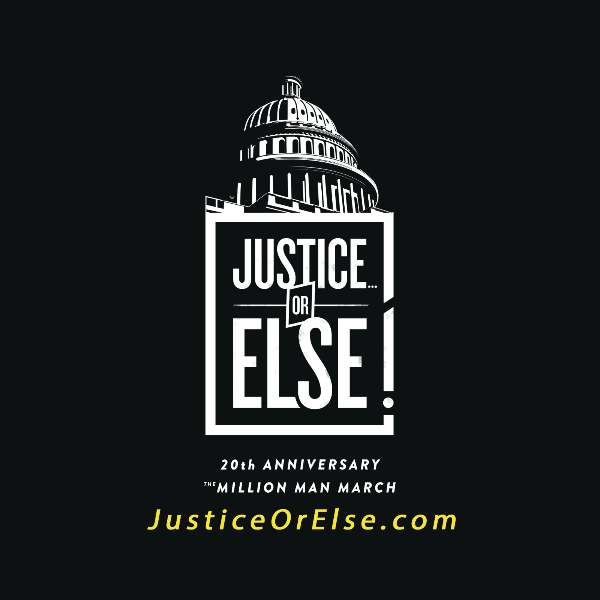The Million Man March, held on October 16, 1995, in Washington, D.C., stands as a pivotal moment in American history, particularly within the African American community. Mobilized by activist Louis Farrakhan, this demonstration was not merely a call for justice; it embodied a broader struggle for dignity, equality, and self-determination. As Bahá’ís reflect on this momentous event, one might ponder: how do the tenets of Bahá’u’lláh’s teachings resonate within the context of a rally that so forcefully demanded justice? Furthermore, can the essence of “Justice…Or Else!” be understood through the lens of Bahá’í principles? This reflection endeavors to dissect these questions through an exploration of justice in the Bahá’í Faith, the implications of the Million Man March, and the universality of human rights in striving for a more equitable world.
At the crux of Bahá’í teachings is the profound assertion that justice is an essential foundation upon which society must be built. Bahá’u’lláh articulates, “The earth is but one country, and mankind its citizens.” This statement underscores not only the importance of unity but also the necessity of justice as a means of fostering that unity. In the context of the Million Man March, the participants gathered to express a collective yearning for recognition and equity—conditions that are inherently just. This gathering illustrated the urgent demand for justice, a theme that resonates deeply within Bahá’í philosophy.
In observing the Million Man March, it is prudent to recognize that justice is multifaceted. It is not solely the absence of oppression or inequality but encompasses the presence of active, restorative initiatives that promote the welfare of all individuals. The Bahá’í approach to justice is distinctive in that it stresses the importance of a collective ethos. As practitioners embark upon the journey towards social justice, they are encouraged to uphold moral principles, cherishing compassion and empathy as they engage with diverse communities.
Furthermore, the march was not merely an act of protesting against injustice; it was a spiritual and moral reclamation of identity. For many participants, it was a means of affirming their worth in a society that has historically marginalized their existence. Bahá’í teachings affirm the inherent nobility of each human being. In this light, the bond that forms among individuals who seek justice becomes a testament to their divine potential. This connection is quintessentially Bahá’í, as it advocates for recognition of the oneness of humanity, thereby fostering collective upliftment.
“Justice…Or Else!” raises an imperative question regarding the consequences of failing to respond to voices of the oppressed. Within Bahá’í thought, the concept of justice cannot be relegated to a mere obligation; it is a spiritual imperative. The consequences of neglecting justice lead to societal schisms, violence, and disunity, which directly contradict the aspirations of the Bahá’í Faith. Can we, therefore, ascertain that the call for justice is not only a plea for correction but also an invitation to a higher moral responsibility? This notion challenges individuals and communities to move beyond passive acknowledgment of injustice and instead commit to constructive action.
The Million Man March served as a catalyst for dialogue on systemic failures and injustices that plague society, particularly in the realms of race, socio-economic standing, and education. Bahá’ís are urged to engage in such dialogues, utilizing their understanding of oneness to dismantle barriers that perpetuate division. In this way, Bahá’ís can contribute meaningfully to the ongoing discourse surrounding race and justice in America.
Additionally, Bahá’í teachings place a strong emphasis on consultation as a mechanism for social harmony. Engaging in dialogue is essential for the reconciliation of diverse perspectives; it is through inclusive consultation that community-oriented solutions can be devised. The Million Man March exemplified a form of consultation that sought to galvanize individuals towards a common goal. Within the Bahá’í community, the invocation of consultative principles can serve as a paradigm for fostering understanding in discussions surrounding justice and inequality.
Moreover, the Bahá’í perspective on global justice extends beyond localized narratives. It confronts the pressing needs for systemic change, recognizing the interconnectedness of humanity in addressing inequalities that transcend borders. This global outlook aligns with the core message of the Million Man March: to advocate not only for African Americans but for the upliftment of humanity as a whole. The march, as a manifestation of collective consciousness, reinforces the imperative for universal justice that Bahá’ís uphold.
As one contemplates the teachings of Bahá’u’lláh in relation to the overarching theme of “Justice…Or Else!”, it becomes essential to acknowledge the transformative potential of justice. The embodiment of justice serves not merely as a remedy but as a guiding principle that permeates the fabric of human relations. Addressing the discomforting realities of injustice requires dedication and tenacity, qualities that are integral to Bahá’í practice.
In conclusion, the Million Man March exemplifies a vibrant struggle for justice that aligns with Bahá’í teachings. It invokes a spirit of collective action that seeks to address the injustices of the past and present. The principles of justice, unity, and equity remain paramount in leading a world towards love, understanding, and harmony. In reflecting upon the significance of justice as portrayed through this historic event, Bahá’ís find not only a challenge but also an affirmation of their commitment to uphold the dignity and rights of all. Ultimately, may the clarion call of justice resonate ever more deeply within the hearts of humanity, prompting actionable change while embodying the fundamental tenets of Bahá’í belief.
